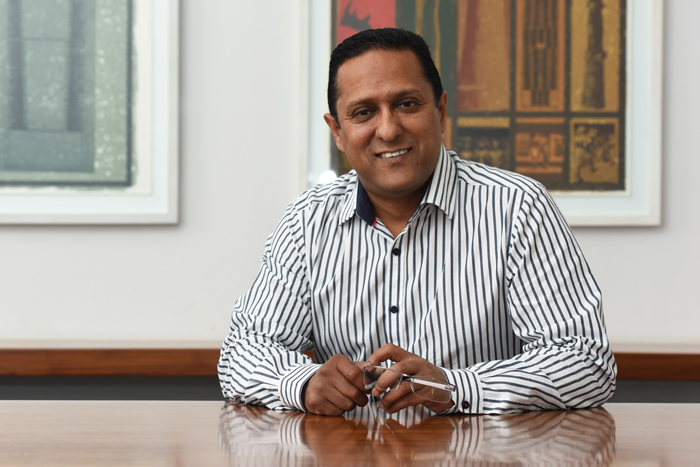New registrar: 'more than just a channel for bureaucracy'
29 January 2016 | Story by Newsroom
Royston Pillay, UCT's newly appointed registrar, wants to embed a culture of questioning assumptions and 'old ways of doing things' as the country's universities tread unpredictable waters.
As if to demonstrate a 'typical' day in the new registrar's office, Royston Pillay apologised numerous times when pausing this writer's interview with him to urgently tend to constant knocks at his door and a bleeping cellphone. “It's the new normal,” says Pillay, after emerging from a text conversation.
UCT's new registrar is an educationalist to the core. He taught at Grassy Park High, working his way up to the deputy principal's seat. His first job at UCT was as the head of the student affairs secretariat, acting as a conduit between the student leadership and university management.
This was after graduating from UCT with arts, social sciences and education qualifications.
“So there was the initial exposure to UCT as a student, during my undergrad and early postgrad, and then my first job at UCT was in the student services.”
That was followed by a stint in faculty administration when Pillay became the Faculty of Humanities' first faculty manager responsible for academic administration in 1999.
“Academic administration is a really important component of the job of registrar, so in terms of cutting my teeth and gaining exposure to the kind of work that forms part of the wider domain of the responsibilities of the registrar, my time in the faculty gave me valuable experience.”
Two years later he became the director of student admissions. This required him to work closely with the registrar's office. “So there's an alignment between what I was doing at admissions and the wider portfolio of the office of the registrar.”
He held this position until 2004, when he moved to the Office of the Vice-Chancellor (OVC) to serve as its director. The view from the OVC, he says, gave him deep insights into the “belly of the beast” that is UCT and honed his understanding of the strategy considerations and “big picture issues” at the university.
“That really helped me to understand this institution and its complexity in ways that would not have been possible had I not worked in the Office of the Vice-Chancellor for a sustained period of time, and with two VCs (Professor Njabulo Ndebele and Dr Max Price) and a number of different deputy vice-chancellors,” he says.
Steeped in education
So Pillay's journey has been an interesting form of orientation for the position of registrar. Having immersed himself in the world of education from the get-go, his earlier life and work experiences have influenced his own education. “I'm basically a person from the Cape Flats. I was born in District Six and lived in District Six for the first eight years of my life, before my family was moved to the Cape Flats, and still have some lingering memories of the evictions. So I grew up in District 6 and on the Cape Flats.
“That's defined me. I think I understand some of the challenges that we face because of that experience. I think I have good insight into the reality of school life in disadvantaged communities, and I think this will help me in terms of formulating an ongoing plan for the registrar's office but also for the University of Cape Town and how we go about our business.”
Pillay speaks highly of his education at South Peninsula High School.
“I had teachers that understood the importance of taking students way beyond the narrowness of a textbook. I had teachers who basically prepared me for life. I was very influenced in my young life by New Unity Movement politics and by teachers who shared that inclination.”
The politicised face of the education 'business' that has been thrust into the public eye recently isn't new to him.
The 'new normal'
With #FeesMustFall a major new player on the educational landscape, we have left an era where we can be comfortable in knowing what tomorrow will hold, says Pillay.
“The certainty that makes us comfortable has been disturbed. There is unpredictability. I think there's a much, much deeper level of complexity in terms of what we have to deal with, in terms of what we have to engage with as a society, as a sector, and as an individual tertiary institution.”
It's the “new normal. It's a moment for everybody in higher education to take a step back and reflect on different ways to solve problems and engage challenges,” he adds.
View from the registrar's office
Having said all that, what does a registrar do?
“It's a pretty big job,” he says. “The registrar's office is a cradle on which so much else pivots in terms of academic administration across the university, in terms of legal and systems work, and in terms of governance support to statutory bodies like Senate, Council [and] Convocation.”
It's a team effort. Pillay wants to coax the people around him to go beyond their limits, demonstrating that each staff member's institutional memory is valuable and can be harnessed. He believes that everyone has something to offer.
“One should always encourage people to be creative, to take chances. Just because something was done in a particular way for years, it doesn't necessarily mean that that continues to be the best way to do things.
“But sometimes the power and influence of how things had been done makes people reluctant to experiment, or even to ask the question.”
He is keen to foster a culture of asking these questions more and more.
Pillay would also like to see the professional staff (PASS staff) be increasingly “recognised for the really important professional contribution that they make to this university”.
“We have to celebrate that and encourage their contribution to the core business. And the core business is fundamentally in the interest of advancing our society, our country, continent and world.”
He lays down a challenge for staff, particularly those in the registrar's department.
“See yourself as more than just a channel for bureaucracy. If we constrain ourselves in terms of how we see our roles, we limit our capacity to make an even bigger contribution.”
Story by Yusuf Omar. Photo by Michael Hammond.
 This work is licensed under a Creative Commons Attribution-NoDerivatives 4.0 International License.
This work is licensed under a Creative Commons Attribution-NoDerivatives 4.0 International License.
Please view the republishing articles page for more information.










